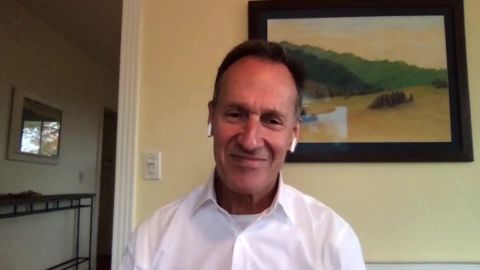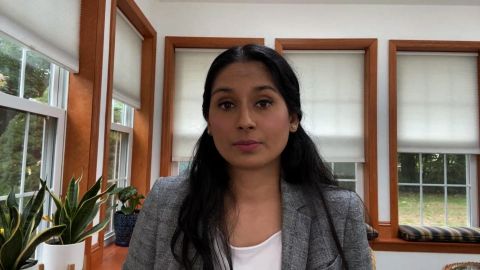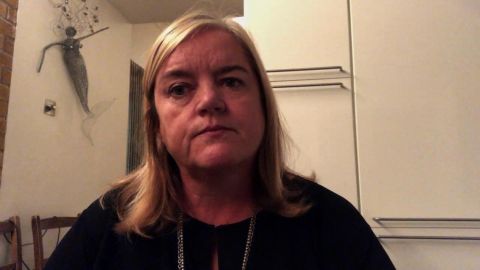Read Transcript EXPAND
CHRISTIANE AMANPOUR: Now, the pandemic has brought with it also a season of emotional suffering as waves of grief and loss and isolation roll around the world. My next guest says it’s our aversion to uncertainty that’s fueling this anxiety as difficult questions remain over if and when life will return to normal. Dr. Richard Friedman is a professor of clinical Psychiatry at the Weill Cornell Medical College who specializes in mood disorders. And here he is speaking to our Michel Martin about the importance of mental health as we navigate this virus in a tense election cycle as well.
MICHEL MARTIN: Thanks, Christiane. Dr. Friedman, thank you so much for visiting with us.
DR. RICHARD A. FRIEDMAN, PROF. OF CLINICAL PSYCHIATRY, WELL CORNELL MEDICAL COLLEGE: My pleasure.
MARTIN: You know, you hear people talk all the time about how stressful these last couple of months have been. And I do wonder if there’s just some data about that, that says that this really has been a particularly stressful period.
FRIEDMAN: Sure. I mean, there are plenty of data about just what the impact of COVID has been and all the other events in people’s lives in the last couple of months. And they all show generally that the level of distress, psychological distress and anxiety and depression has gone up significantly. So if you look at all the surveys together, you just sum them all up, it looks as if the rates of anxiety and depressive symptoms have tripled or quadrupled, you know, post COVID compared to periods before COVID, which is You know, very alarming.
MARTIN: And so let’s talk about that, the general population, what’s been the worst of it?
FRIEDMAN: I think probably psychologically the worst aspect of it is confinement, is the lockdown. Because the lockdown essentially means you’re cut off from your daily routine, and you’re cut off from other people, except the people you actually happen to be living with. And that’s enormously stressful, because we’re social animals. And psychological, you know, being lonely and being isolated, is very bad for your physical health and for your mental health. And it’s extremely immersive.
MARTIN: I know you just recently wrote a piece about, that talk a little bit more about why that is, because I think, you know, some people might think, well, you know, it’s boring, or it’s a bummer. But what you’re saying it really is harmful to your health. Tell me a little bit more about why.
FRIEDMAN: So there are two aspects to it. One is that people when they’re confined are locked away from the world. And so we don’t have exposure to all the sort of unexpected events that we are privy to in our daily lives. So you go outside on the street and you see people you don’t know, you’ve experience this. All kinds of unexpected experiences, all day long, they’re stimulating. And so you’re stripped of that. So you’re not free to roam around the world and have those experiences. And that cuts us off from a level of stimulation. And we need a certain amount of stimulation or social stimulation. And so, you know, that’s one aspect of it. The other is that you’re lonely, because you can’t see your friends and much of your family, except virtually, either the way we are by Zoom or by telephone. And so it cuts people off socially, and it increases stress and increases anxiety and makes people feel sad and lonely.
MARTIN: We’re about to enter into a kind of a heavy holiday period. I guess that these virtual experiences, it really you and I are having one right now and, you know, it’s fine. But why is it that these virtual experiences don’t feel as satisfying? And I had a Zoom, you know, dinner with my family, but it just, it just doesn’t feel the same? Why is that?
FRIEDMAN: Right. A Zoom turkey doesn’t taste the same. I think in part, well, first of all, we assume that’s the case, right? We assume that all these virtual connections are not equivalent to in person, in face connection. And I think that that might be true, but we actually don’t have good data to prove that that’s the case. But there are reasons to assume that it might not be for one, we’re tactile, we like to touch each other. And we get all kinds of information by being with somebody in the flesh, you can smell them, you can see them, you can hug them, you can touch them, it’s hard to do that. I mean, I remember the first time I went out and broke isolation and had dinner with friends who also had been isolated, it was so stimulating, and so exciting to see them in person, although I’ve been looking at them on the screen for weeks. It was clearly very different. It may be the case that for people you already know and you have a connection with, talking, you know, virtually suffices, it may not be the equivalent, but it’s much better than nothing. To be able to see their face, to be able to hear their voice that actually provides something that helps with isolation. So I don’t mean to knock virtual connection. I think it’s critical, it’s really important. But it may not be the same thing. And all the studies that are done up to this point, looking at the effects of social isolation measure, you know, social connection by in person meetings. So, we don’t actually know whether virtual connections will count in quite the same way as in person connections, when you look at, you know, future studies on the impact of social isolation.
MARTIN: And for people who are already before COVID, before the shutdowns, we’re experiencing anxiety or depression, what are the particular sort of vulnerabilities for them?
FRIEDMAN: So they’re much more likely when they’re socially isolated to develop clinical levels of anxiety and depression and have a relapse of their preexisting problem. So if you have a history of depression, let’s say, we know social isolation is particularly hard, and stress and worry. So, you know, one of the things about COVID is, you know, people are cut off from their friends and from work and they have all kinds of economic pressures. People have lost their jobs. They’re worried they can’t make ends meet. They’re not sure if they get sick, they’re going to have care, they might die, who’s going to take care of them. So if you’re somebody with a history of depression going into that reality, it’s particularly stressful. And so, we look at those people and say they were at higher risk of having a recurrence of their depression.
MARTIN: Are you seeing that yourself? I mean with your peers and your practices, with just in terms of your professional work?
FRIEDMAN: You know, initially I wasn’t. And I think it was because of — it was because of the effect of time. I think now as it’s going on, and the lockdowns have no end in sight in a way, where we may experience a second wave, so there’s uncertainty, now people are getting more anxious and more depressed. And obviously, I have a biased sample, because I’m a psychiatrist, and I treat people with those problems. And it’s very challenging for them now. And I think the one thing that we don’t talk a lot about is how aversive uncertainty is.
MARTIN: Tell me more about that?
FRIEDMAN: Well, we don’t really know what’s going to happen to us. I mean, people, though it’s — COVID is an invisible microbe, right? I mean, you can’t know whether you’re safe in any setting. There are things that you can do, you’re not powerless, you can wear masks, you can socially distance, you can do all kinds of things to protect yourself. But in the end, there’s a certain degree of uncertainty. We can use the good news, we can use the bad news, good situations, bad situations, as long as you know what they are. But it’s very hard to get used to an uncertain one. And in part, it’s because I think we’ve evolved, we’ve been hardwired by evolution to, you know, detect danger in our environment, that’s what saves us. And uncertainty means, you know, hey, right around the corner, there could be something that’s dangerous or threatening to, and that means you’re vigilant and anxious. And so uncertainty produces a state of constant anxiety and stress. You know, we know this early on from HIV studies, from genetic testing studies, people who would go in and get an HIV test in the early days, when, you know, there were no treatments available. And this was, you know, a uniformly almost fatal diagnosis. People were asked beforehand, they were much more anxious, much more dysphoric depressed. When they got the results and they were positive or negative, their mood was better and their adjustment was better than during the waiting period. So the uncertainty was really corrosive in a way that certainty, either positive certainty or negative certainty isn’t, because I think you can adjust. You can accept something that’s very stressful, but you can adjust to it, you can learn to live with it.
MARTIN: You know, health care workers have experienced a lot of trauma, you know, depending on where they are. And in some places, I mean, the, you know, the working conditions have been horrific. They’ve been exposed to, you know, way more suffering than many of them even the best trained and the most experienced have ever experienced. And I’m interested in your thoughts on, you know, how they move forward.
FRIEDMAN: Oh, yes. I mean, as a group, if you talk about a group that’s been traumatized, it’s the medical providers, the heroes and the heroines in this whole pandemic. And, you know, I mean, I know, for my colleagues and working in the hospital, that they were on the front lines. And these are, for the most part, young healthy people who saw death, sorry, on a level that they had never seen before, even though they were physicians, and sometimes saw their own colleagues get sick and take care of their colleagues and that the trauma of sometimes seeing their young healthy colleagues die from COVID. So, the rates of depression, anxiety and PTSD is much, much higher, I think, in this medical population. And I’m very worried about that. I mean the rates are sometimes reported as high as 40 percent, 50 percent, of doctors who were on the front lines who have significant enough depression. This was true in China, that they had trouble going back to work. And what are we going to do if we have a second wave?
MARTIN: Well, I have a political layer to this, if I may, because on top of this, it’s in the middle of a very contested election, people seem to feel the stakes are really high. And I was interested in your take on whether the politics of a moment kind of add to this stress?
FRIEDMAN: Oh, certainly. I mean, you’ve got — essentially, if you think of the country in a way like a brain, you know, this is a time of high expressed emotion, fear, anxiety, you’ve got a president who thrives on stress and tension and racial division, and is a very angry person. And so, he is essentially signal to everybody that he’s going to rile up his base. He’s going to rile up with the country. And instead of calming things down and saying, as a moral leader could, you know what, this is a very scary moment we’re in. We’re facing a pandemic, but I know that we can get through this because we have science and good public health measures that we can take to protect ourselves, like wearing masks and social distancing, and figure out intelligent ways to deal with this problem. Instead, you had somebody who basically said, in effect to the country, you’re on your own. I wash my hands of it, I’m not responsible. So, what does that do to people? Well, the country looks to its leader to calm them and say, you know, it’s a difficult moment, but we’re going to be OK. We’re in this together. And we’re going to use the prestige, the power, the science, the, you know, the force of, you know, the federal government for good to do something to help you feel safe. If you take that away, you make people much more anxious, much more frightened. And then if you look at the political situation, in which there is violence in certain areas and terrible tension and highly polarized groups of people, those, you know, who are Republicans and those who are Democrats, I can’t remember a time where the country has ever been so polarized. So the emotional state, the high emotional temperature of the country makes it hard for people to take a step back and calm themselves down.
MARTIN: And if you look at the debate, the last the second and final presidential debate, which was held Thursday night, in their closing remarks, they were asked to speak to — both candidates were asked to speak to people who did not vote for them. And President Trump painted this very dire picture of what he said the outcome of would be for the country if former Vice President Joe Biden is elected. And former Vice President Joe Biden had a very different message. He said, I’m going to be the president for everyone, and not just the people who voted for me. And you know, it’s just hard to talk about this without feeling like you’re making a partisan statement. But these are very different types of leaders. And President Trump is making very is delivering very specific messages, which are that it’s, you know, it’s going to be terrible if I’m not the president. And I just wonder if that does stoke a certain anxiety.
FRIEDMAN: It’s not a partisan question. It’s a question about psychology. Trump’s message essentially is, if I don’t win, you will all suffer. The country will go down in flames, terrible things will happen, the suburbs will vanish, America will be overcome by Carnage, which, of course, is ridiculous. It’s a message designed to make people feel frightened. And given the fact that, you know, until election on one side is going to lose. So you’re voting — someone is going to vote for the losing team, right. And if you view this as a sports metaphor. We know what happens when teams lose, fans feel terrible, they feel depressed, they feel dejected, they’re anxious, they’re stressed. And you know, there’s a fair amount of literature on this. They actually are at risk, medical, and emotional risk of losing. So, one candidate is basically saying, you know, what, if I’m president, I’m all of your president. I’m president for all of you, which softens the blow for the losing team. Whereas Trump’s message was, if you lose, boy, you’re really going to suffer. So, I think that psychologically, you know, it’s a valid question. It’s not a partisan question. It’s a psychological questions of two different — very, very different approaches to an adversarial process, an election. Someone’s going to lose, someone’s going to win. Of course, the President is basically saying, you know, I can only lose if people cheat and has undermined the integrity of the election from the start.
MARTIN: The election is soon upon us. How does the country go forward after this? And how did people go forward psychologically?
FRIEDMAN: Right. So I’ve been thinking about this recently and having discussions with friends and colleagues. Some of them are pessimistic and say things to me like, you know, we will never be able to trust one another again. We’ve lost something. And how will we ever regain a sense of normalcy in the country after these four years of strife and tension and discord? In my view is a lot more optimistic. And the reason is, I think people essentially, most people, essentially, are very flexible and decent human beings and are uniquely susceptible to the influence of leadership. So if you have a benign leader, who cares about people and signals that he wants harmony, and wants to include people, I think you will see very quick turnaround in the national sort of emotional temperature. The damage that’s been done to institutions and all kinds of things that, you know, your pundits can talk more intelligently about than I can, they may take a long time to normalize and recover. But I think emotionally when you’re talking about how people feel, I think that we’re very, very susceptible to the tone of our leader, and the direction of a leader. And that can change very quickly, positively or negatively. We’re malleable.
MARTIN: Dr. Richard Freeman, thank you so much for talking with us today.
FRIEDMAN: My pleasure. Thank you for having me.
About This Episode EXPAND
Dr. Syra Madad discusses the trajectory of the pandemic in the coming weeks. Louise Casey, a former UK government adviser on homelessness, explains how COVID-19 has exposed a massive inequality gap. Dr. Richard A. Friedman explains the impact of the COVID-19 pandemic on mental health.
LEARN MORE


